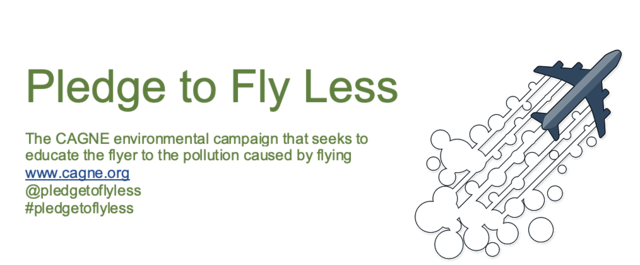CAGNE Discusses Its #PledgeToFlyLess Plan
14th January, 2023 - 11:29

Communities Against Gatwick Noise Emissions (CAGNE) is a community group concerned with aircraft noise in Surrey, Sussex and Kent, and with the worldwide environmental impact of aviation. Here CAGNE discusses its #PledgeToFlyLess campaign.
Flying is not something that everyone does and yet, since the Second World War, aviation has benefited from not having to pay duty or VAT. Even so, every year aviation burns more cheap fuel, making aviation the fastest-growing source of greenhouse gas emissions.
Alternative fuels and technology seeking to make aviation carbon neutral are still on the drawing board and only at prototype stage. The CAGNE environmental campaign, Pledge to Fly Less, does not seek to demonise those that fly but to inform them of the damage they do to the planet when flying.
Just as a packet of cigarettes informs you of the health risks of smoking, we asked the government to inform flyers how much CO2 their flights would emit, and to provide an example of a comparable daily life activity to illustrate the vast amount released. This information would be provided at the time of booking a flight. This is to inform; this is to help the consumer make an informed decision. We are delighted that this is now being seriously considered by the government.
Transport & Environment state that aviation remains the fastest-growing source of emissions in Europe, having increased by 26% between 2013 and 2018. It now represents 4.2% of European emissions. Aviation’s non-CO2 effects expand the climate impact of the sector even further. [i]
HMRC income from Air Passenger Duty is £3.5bn. Air Passenger Duty would need to be 3.4 times its current level to reach tax parity with road users.
Aviation is a luxury industry – 70% of UK flights are made by a wealthy 15% of the population, with 57% not flying abroad at all [ii]. If aviation is to be allowed to grow, sustainable aviation fuels will have to play a critical role in achieving the government’s goal of transatlantic flights not harming the environment within a generation. Green energy will also be required by other sectors, so we must question whether it would be better used to reduce heating costs and remove fossil-fuelled cars from roads, rather than for a luxury industry.
The government’s commitment to provide £350 million to fuel the green recovery (not just in aviation) must be welcomed, but it must also be taken in perspective, as the HS2 railway is costing £403m per mile [iii] and the new road-building budget is £27bn [iv].
CAGNE watches with interest but, until green commercial aviation fuels become a reality, CAGNE must continue to call for no aviation growth and constraint, as flying is one of the biggest threats that our planet faces today. #PledgeToFlyLess for 2023.
[i] Transport and Environment E-Fuel Position Paper
[ii] https://www.bbc.co.uk/news/business-49808258
[iii] https://www.independent.co.uk/news/uk/home-news/hs2-high-speed-railway-most-expensive-world-403-million-mile-michael-byng-a7843481.html#:~:text=HS2%20%27will%20be%20most%20expensive%20railway%20on%20Earth,expected%20to%20reach%20%C2%A3403m%2C%20according%20to%20Government%20calculations
[iv] https://www.theguardian.com/uk-news/2020/mar/11/chancellor-announces-27bn-for-roadbuilding-in-budget



